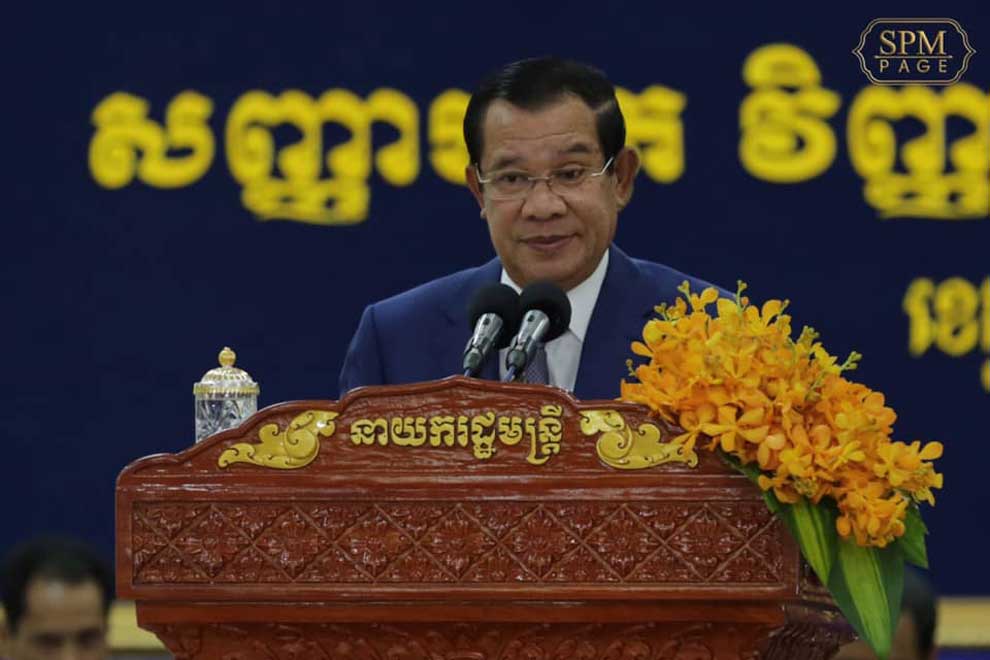
Hun Sen has signed a sub-decree saying the number of public holidays will be reduced from 28 to 22 days from next year. hun sen’s facebook page
The number of Cambodian public holidays will be reduced from 28 to 22 days from next year. International Human Rights Day, International Children’s Day and the Paris Peace Agreements Day will be among those cancelled.
In a major shake-up of the Kingdom’s public holidays, the Khmer New Year break has been increased to four days, while the King’s three-day birthday celebrations will be reduced to one.
A sub-decree on public holidays for civil servants and employees signed by Prime Minister Hun Sen and seen by The Post on Tuesday also states that the Meak Bochea Buddhist festival and the National Day of Remembrance commemorating the horrors of the Khmer Rouge will also be cancelled.
Government spokesman Phay Siphan could not be reached for comment on Tuesday.
Council of Ministers spokesman Ek Tha told The Post that the move came in response to complaints from investors that Cambodia had more public holidays than other countries.
“We need to reduce the number of public holidays to make Cambodia more attractive for national and international investors. Don’t interpret it differently from this,” he stressed.
However, he did not elaborate on why the government had chosen to cancel certain major public holidays over others, a move which had drawn criticism.
Hun Sen announced in March that from next year, Cambodia’s 28 public holidays for civil servants and employees would be reduced in a bid to encourage investors and drive further economic growth.
Cambodia, though a poor country, has many more public holidays than richer nations, he said at the time.
The changes to the Kingdom’s public holidays, particularly the loss of some major ones, has provoked criticism from members of the public, analysts and civil society groups.
Cambodian Centre for Human Rights (CCHR) executive director Chak Sopheap said she agreed with the necessity to reduce public holidays for Cambodia to remain competitive.
However, she said the decision to cancel certain holidays, particularly International Children’s Day and International Human Rights Day, appeared to go against the principles of human rights that Cambodia was committed to applying.
Allowing these days off, she said, fostered an atmosphere in which people could discover more about the values of human rights. It also enables them to attend events held on these days.
Even with the present system, she said, some employers put pressure on workers who wish to attend such events despite them being held on a day off.
“I think this is a lost opportunity for ending conflicting opinions on controversial public holidays such as the Victory over Genocide Day on January 7, Paris Peace Agreements Day, Independence Day and Constitution Day,” she said.
The controversial holidays, she stressed, could be merged as one day and named Independence and National Independence Day – a day for the whole nation to celebrate joyfully together, not for only a group or political party.
Sopheap continued that many countries had set their “national holidays” and celebrations had featured many programmes attended by a large number of people.
“Overall, no matter how the days are set, may the spirit of respect for and protection of human rights, as well as the necessity for national reconciliation and national independence, be on the agenda for all of us to develop the country sustainably and in peace,” Sopheap reiterated.
Political analyst Lao Mong Hay said the cancellation of six days off next year was unfair for employees and workers.
He said from next year they would have to work on those days to help increase their factories’ productivity should the “Everything But Arms” (EBA) agreement be withdrawn.
“To be fair, they must combine the holidays to annual leave for employees and workers instead. That means they could take any days to take a day off according to their choice,” he said.












